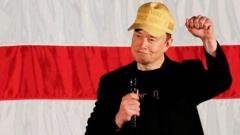In a bold but controversial move, billionaire tech mogul Elon Musk announced he plans to give away $1 million a day to registered voters in critical swing states leading up to the US presidential election on November 5. The initiative, launched by Musk's political action committee AmericaPAC, aims to incentivize citizens to sign a pro-US Constitution petition linked to the campaign supporting former President Donald Trump.
The giveaway began with a surprise announcement at a town hall event in Pennsylvania, where Musk handed out checks to two lucky attendees over the weekend. The initiative is open to voters in pivotal states such as Pennsylvania, Georgia, Nevada, Arizona, Michigan, Wisconsin, and North Carolina—key battlegrounds that hold significant sway over the election outcome. However, the strategy has sparked significant backlash, with critics labeling it “deeply concerning.”
Pennsylvania's Governor Josh Shapiro, a Democrat in favor of Kamala Harris, criticized Musk's tactics during an appearance on NBC News' "Meet the Press," suggesting law enforcement may need to investigate the legality of the payments. Legal experts are also weighing in, with election law specialist Rick Hasen expressing doubts about the legality of Musk's $100 payment per signed petition. Under federal law, offering payments to encourage voter registration or casting a vote can lead to hefty fines or even jail time.
The petition requires signers to provide their contact details, which critics argue could allow AmericaPAC to build a targeted database of likely Trump voters. Musk's model also includes additional incentives for referrals, further complicating the ethical landscape. While some argue that Musk's initiative cleverly navigates current election laws—given that payouts are contingent on signing a petition rather than voting directly—the potential ramifications for voter manipulation are troubling.
Amid these controversies, Trump has remained nonchalant, stating he is unaware of the giveaway while emphasizing his friendship with Musk. The latter, known for his influence and vast wealth, has already contributed $75 million to AmericaPAC since its formation. The committee aims to rally support around principles such as secure borders, free speech, and the right to self-protection. Musk has stated his goal is to rally over a million voters in these critical states, making clear his hope to send a message to politicians about the importance of the First and Second Amendments.
As the election nears, Musk's unprecedented approach raises pressing questions about the intersection of wealth, influence, and electoral integrity in American democracy. With Musk being labeled the world’s richest man at an estimated net worth of $248 billion, this unfolding narrative may shape the election landscape in unpredictable ways.
The giveaway began with a surprise announcement at a town hall event in Pennsylvania, where Musk handed out checks to two lucky attendees over the weekend. The initiative is open to voters in pivotal states such as Pennsylvania, Georgia, Nevada, Arizona, Michigan, Wisconsin, and North Carolina—key battlegrounds that hold significant sway over the election outcome. However, the strategy has sparked significant backlash, with critics labeling it “deeply concerning.”
Pennsylvania's Governor Josh Shapiro, a Democrat in favor of Kamala Harris, criticized Musk's tactics during an appearance on NBC News' "Meet the Press," suggesting law enforcement may need to investigate the legality of the payments. Legal experts are also weighing in, with election law specialist Rick Hasen expressing doubts about the legality of Musk's $100 payment per signed petition. Under federal law, offering payments to encourage voter registration or casting a vote can lead to hefty fines or even jail time.
The petition requires signers to provide their contact details, which critics argue could allow AmericaPAC to build a targeted database of likely Trump voters. Musk's model also includes additional incentives for referrals, further complicating the ethical landscape. While some argue that Musk's initiative cleverly navigates current election laws—given that payouts are contingent on signing a petition rather than voting directly—the potential ramifications for voter manipulation are troubling.
Amid these controversies, Trump has remained nonchalant, stating he is unaware of the giveaway while emphasizing his friendship with Musk. The latter, known for his influence and vast wealth, has already contributed $75 million to AmericaPAC since its formation. The committee aims to rally support around principles such as secure borders, free speech, and the right to self-protection. Musk has stated his goal is to rally over a million voters in these critical states, making clear his hope to send a message to politicians about the importance of the First and Second Amendments.
As the election nears, Musk's unprecedented approach raises pressing questions about the intersection of wealth, influence, and electoral integrity in American democracy. With Musk being labeled the world’s richest man at an estimated net worth of $248 billion, this unfolding narrative may shape the election landscape in unpredictable ways.





















